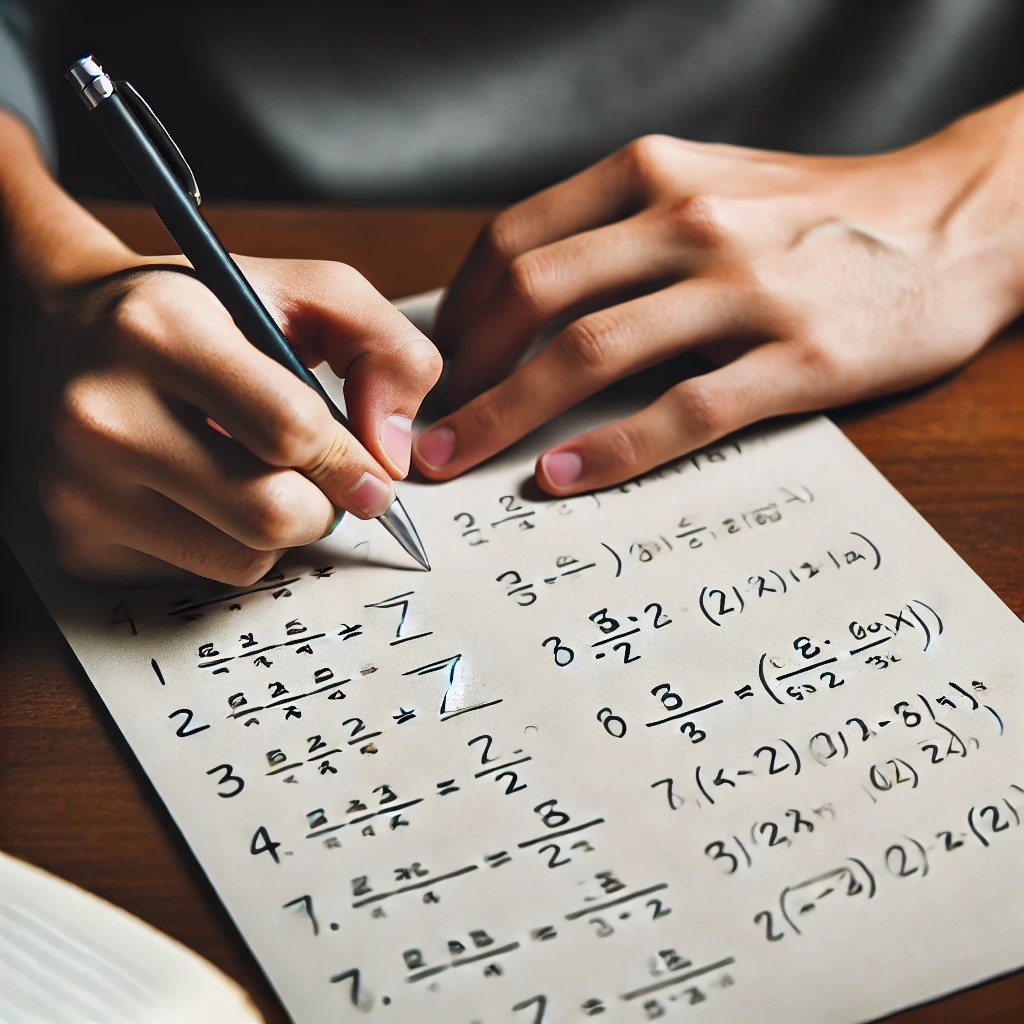Mathematics can be challenging, but with the right strategies, students can improve their test scores and build confidence. Whether you’re struggling with algebra, geometry, or calculus, these tips will help you enhance your math skills and perform better on exams.
1. Understand the Concepts, Not Just the Formulas

Memorizing formulas is useful, but understanding the logic behind them is crucial. Many students make the mistake of blindly applying formulas without truly knowing why they work. Instead, take time to explore the fundamental principles behind mathematical concepts. Ask yourself questions like: Why does this formula work? How is it derived? Understanding the ‘why’ helps in applying concepts effectively in different scenarios. Engage in real-life applications of math to see how these concepts function beyond textbooks. Teaching concepts to someone else can also reinforce your understanding.
2. Practice Regularly
Math requires consistent practice. Set aside time daily to solve problems, review notes, and work on sample tests. The more problems you solve, the better your understanding becomes. Regular practice also helps reinforce memory retention and increases problem-solving speed. Try using different types of problems to cover all possible variations. Keep a math journal to note down difficult problems and revisit them after some time. Spaced repetition is a great technique to reinforce learning over time.

3. Use Online Resources and Math Apps

There are numerous online platforms, such as Khan Academy, Wolfram Alpha, and Mathway, that offer video tutorials, practice exercises, and step-by-step solutions to math problems. These resources can be beneficial for visual learners who find it easier to grasp concepts through guided instruction. Additionally, math apps allow you to practice on the go, making it easier to integrate learning into your daily routine. Using gamified learning apps can make studying math fun and engaging while reinforcing core concepts.
Recommended: What Is a Perfect Square in Math? A Complete Guide
4. Work on Weak Areas
Identify the topics you struggle with and dedicate extra time to them. Instead of avoiding difficult topics, tackle them head-on by reviewing lesson materials, watching explanatory videos, and practicing more problems. Seek help from teachers, tutors, or classmates to clarify doubts and strengthen your understanding. Overcoming weak areas will boost your overall math performance. Break down complex topics into smaller parts and master them step by step. Keep a log of errors and track improvements over time.

5. Take Practice Tests

Simulating test conditions with practice exams can help you manage time effectively and identify areas needing improvement. Aim to complete each test within the given time frame, and treat each practice session as if it were the actual test. This helps in reducing test anxiety and improving confidence. The more you practice under exam-like conditions, the more comfortable you will become during the actual test. Review past papers and try to identify common question patterns to be better prepared.
6. Review Mistakes Carefully
After completing practice tests or homework, review your mistakes to understand where you went wrong. Instead of just looking at the correct answer, analyze your thought process and figure out why you made the mistake. Were you rushing through the problem? Did you misinterpret the question? Understanding your errors ensures you don’t repeat them on the actual test. Make notes of the mistakes you frequently make and create a checklist to avoid them in the future.
Recommended: How Many Questions Are on the SAT? 2025 Update

7. Develop Strong Problem-Solving Techniques

Break problems into smaller steps, use logical reasoning, and check your answers for accuracy. Developing systematic approaches can make solving complex problems easier. For instance, you can start by identifying known values, writing down formulas, and working through each step methodically. Using estimation and double-checking calculations can also help prevent careless mistakes. Learning multiple approaches to solving a problem can provide flexibility in exams.
8. Improve Time Management Skills
Math tests often come with time constraints. Practice solving problems under timed conditions to increase speed and efficiency while maintaining accuracy. Create a time allocation strategy—spend more time on complex problems and move quickly through easier ones. Skipping difficult problems and returning to them later can also help you maximize your score. Using timers during practice sessions can help simulate real test conditions and improve your pacing.

9. Stay Positive and Confident

A positive mindset is essential for success. Avoid math anxiety by staying calm, believing in your abilities, and approaching each problem with confidence. Confidence comes with preparation—so the more you practice, the better you’ll feel about your skills. Use positive affirmations like “I can solve this problem” to keep a motivated attitude. Deep breathing and mindfulness techniques can also help in keeping a clear mind during exams.
10. Seek Extra Help When Needed
If you’re struggling, don’t hesitate to ask for help. Join study groups, attend extra classes, or work with a tutor to reinforce your learning. A tutor can provide personalized guidance and explain difficult concepts in ways that may be easier to understand. Additionally, discussing math problems with peers can lead to new insights and learning techniques. Participating in math workshops or online forums can expose you to different perspectives on problem-solving.
Recommended: Enhancing Mathematical Thinking: Conceptual Understanding & Habits of Mind

11. Apply Math to Real-Life Scenarios

Connecting math to real-world applications makes it more engaging and meaningful. Try relating math problems to everyday activities, such as budgeting, shopping, cooking, or sports statistics. When you see how math is used in different industries like engineering, finance, and technology, you’ll develop a greater appreciation for its importance. Hands-on projects, like building models or analyzing data, can also strengthen your practical math skills.
12. Maintain a Healthy Study Routine
A well-structured study routine helps in better retention of math concepts. Ensure you get enough sleep, eat nutritious meals, and take breaks between study sessions to improve concentration. Using the Pomodoro technique—studying for 25-minute intervals with short breaks—can enhance focus and productivity. Avoid cramming before exams; instead, review math topics gradually over time. Creating a comfortable and distraction-free study environment also plays a vital role in effective learning.
By following these strategies, you can improve your math test scores, build confidence, and develop strong problem-solving skills that will benefit you beyond the classroom.

Conclusion
Improving math test scores requires dedication, practice, and the right strategies. By understanding concepts, practicing regularly, and utilizing online resources, students can strengthen their math skills. Identifying weak areas, managing time effectively, and staying positive can significantly boost confidence and performance. Seeking help when needed and applying math to real-life scenarios make learning more engaging. Lastly, maintaining a healthy study routine ensures long-term retention and success. With persistence and the right approach, anyone can improve their math abilities and achieve better results in exams.
Moonpreneur is dedicated to transforming conventional education, preparing the next generation with comprehensive learning experiences. Our Innovator Program equips students with vital skills in AI/ML, Robotics, Coding, Game Development, and App Development, fostering entrepreneurship through hands-on learning. This initiative aims to cultivate the workforce of tomorrow by integrating innovative technologies and practical skills in school curriculums.
Register for a 60-minute free workshop today!


























One thing that really helped my child was using math journaling—writing down problem-solving steps and reflections after practice. It made reviewing for tests much easier later on.
I believe sometimes just changing the study environment, like moving to a quiet library or using a whiteboard at home can really help students to focus better and stay motivated while practicing math.